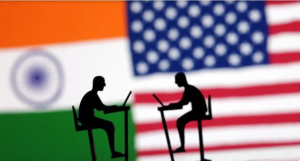In a fascinating twist of international trade dynamics, the United States found itself embroiled in a lobbying effort aimed at reversing laptop rules set by India. This saga unveils the intricate web of economic interests, diplomatic maneuvering, and regulatory frameworks that shape global commerce. Let’s delve into the details of this intriguing episode and explore its implications for both countries and the broader world stage.

India, a burgeoning market for electronics and technology, introduced regulations governing the import and sale of laptops. These rules were designed to safeguard domestic manufacturers, promote indigenous production, and address concerns about foreign dominance in the Indian market. Key provisions included tariffs, import restrictions, and compliance requirements aimed at leveling the playing field for domestic players.
For the United States, home to some of the world’s leading tech companies, India’s laptop rules presented a challenge to its interests in the Indian market. American firms, accustomed to global expansion and market access, viewed the regulations as barriers to trade and investment. They raised concerns about protectionism, market access, and fair competition, advocating for a more open and conducive business environment in India.
Recognizing the stakes involved, U.S. corporations and industry groups launched a concerted lobbying campaign to influence Indian policymakers and decision-makers. This effort encompassed a range of strategies, including direct engagement with government officials, advocacy through trade associations, and leveraging diplomatic channels to convey concerns at the highest levels of government.
Behind the scenes, diplomatic channels served as a conduit for dialogue and negotiation between the U.S. and Indian governments. Bilateral discussions, trade talks, and high-level meetings provided platforms for airing grievances, addressing concerns, and seeking mutually beneficial solutions. The delicate balance between economic interests and diplomatic relations underscored the complexity of the issue at hand.
In the face of mounting pressure from the U.S. and domestic stakeholders, India found itself at a crossroads. Balancing the imperatives of economic development, industrial policy, and international trade obligations posed formidable challenges for Indian policymakers. While cognizant of the need to foster innovation, competition, and consumer choice, India remained steadfast in its commitment to safeguarding national interests and promoting self-reliance in strategic sectors.
The showdown between the U.S. and India over laptop rules reverberated beyond their borders, sending ripples across the global economy. It underscored broader debates about protectionism, free trade, and the role of governments in shaping market dynamics. Countries around the world closely monitored the developments, mindful of the implications for their own trade policies and regulatory frameworks.
As the dust settled on the laptop rules controversy, both the U.S. and India gleaned valuable lessons from the experience. It highlighted the importance of dialogue, cooperation, and mutual understanding in addressing trade disputes and fostering economic relations. Moreover, it underscored the need for countries to strike a balance between fostering domestic industries and embracing globalization in an increasingly interconnected world.
Looking ahead, the U.S.-India relationship continues to evolve in the realm of trade and commerce. While disagreements may arise, opportunities abound for collaboration, innovation, and shared prosperity. As both countries navigate the complexities of the global economy, constructive engagement, and pragmatic solutions will be essential in charting a course towards a more prosperous and inclusive future.
The saga of how the U.S. lobbied to reverse India’s laptop rules offers a compelling glimpse into the dynamics of international trade and diplomacy. It underscores the complexities, challenges, and opportunities inherent in the global marketplace. By understanding and addressing divergent interests, fostering dialogue, and embracing cooperation, countries can navigate the intricacies of trade relations and work towards common goals of economic growth and prosperity.





